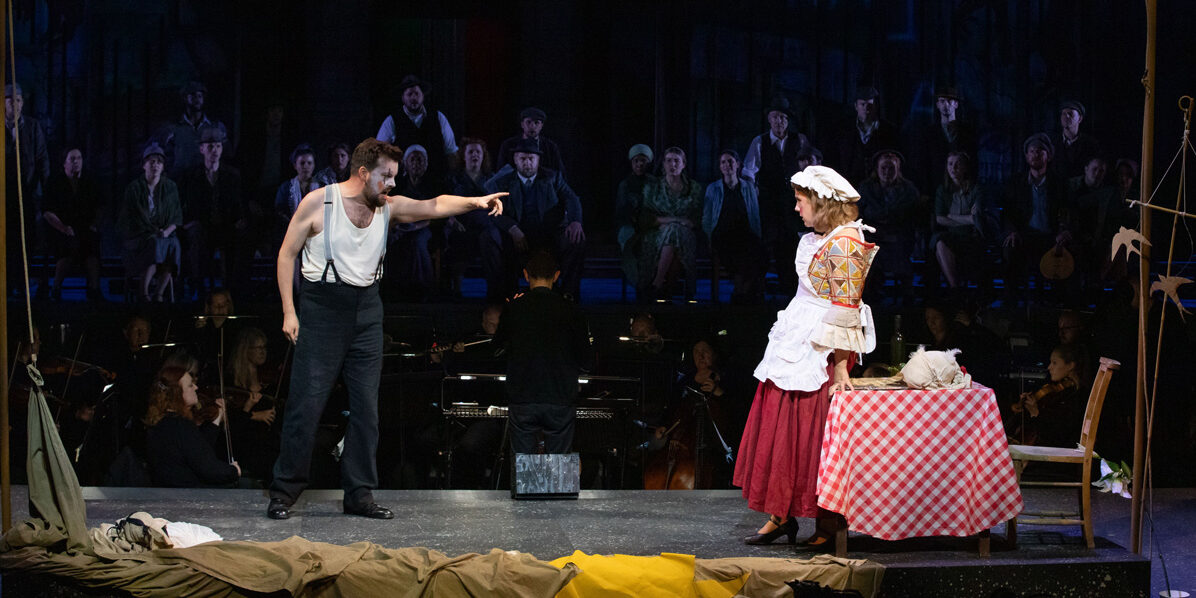Opera Holland Park’s 2024 season offers a notable double bill with the 2019 revival of Ermanno Wolf-Ferrari’s light-hearted one-act comedy Il Segreto di Susanna (1909) paired with Ruggero Leoncavallo’s intense tragedy Pagliacci (1892). Both deal with conjugal jealousy, but with two very different outcomes.
Susanna’s secret (segreto) provokes her husband’s jealousy. Her secret is that she has an smoking addiction which she tries to conceal, by only indulging in when her aristocratic husband, Gil, is out at his club. He, however, comes to assume from the smell of tobacco in their flat, that she has taken a lover behind his back. In Pagliacci, the case of the husband’s outrage is that his wife is having an affair with another man and the consequences are fatal.
Il Segreto di Susanna, directed by John Wilkie, is set in the early decades of the 20th century. The flat is filled with luxury convenience – telephone, the latest in gramophones, with a butler and housemaids at the couple’s begs and call. An opening with expressive mime by the maids and the butler, is a prelude to the musical and dramatic comedic elements within this entertaining production.
The lyrical soprano Clare Presland, as Countess Susanna, produced a warm and bright tone, despite being unwell some days earlier.
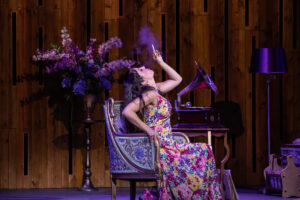
Baritone Richard Burkhard offers a strong stage presence, portraying Count Gil’s jealousy and vulnerability, skilfully using stylised gestures to make a point. Burkhard and Presland make the most of their lightly drawn characters. Their expressive mime techniques add to the overall comedic narrative.
John Savournin is cast as the butler Sante. He neither sing nor speak in this opera, but his exquisite mime techniques add a layer of comic timing and contribute to the unfolding narrative.
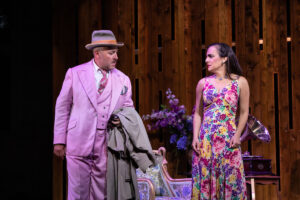
Under the baton of Conductor John Andrews, the City of London Sinfonia delivers a fine performance of this sparkling confection with elegance and finesse. The orchestra is successful in bringing out the charm of Il Segreto di Susanna, which subtly explores the strains of matrimonial misunderstandings.
Pagliacci, an opera in two acts, presents a compelling drama filled with intense emotions and memorable music. In stark contrast to the light-hearted first half of the programme, Pagliacci delves into the turbulent world of a traveling commedia dell’arte troupe, focusing on the raw and real emotions of ordinary people. The characters’ passions, jealousies, and tragedies are depicted with kitchen sink verité.
Martin Lloyd-Evans direction is innovative without upsetting the libretto. There is a heady mix of modern social issues such as domestic violence and societal pressures, giving the story a contemporary relevance without altering the fundamental plot. Even the programme includes a card with information for those affected by domestic abuse, offering a contact number for help.
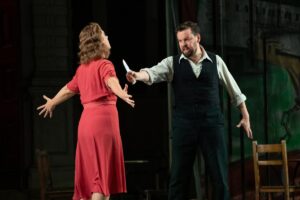
Baritone Robert Hayward delivers a powerful performance as Tonio, opening the opera with a prologue that sets the stage for the drama to unfold. His expressive phrasing and strong stage presence ignite the dramatic energy of the narrative.
David Butt Philip, as Canio, transitions from gentle affection towards his wife Nedda to explosive jealousy and rage with remarkable vocal control. His rendition of “Vesti la giubba” poignantly captures Canio’s inner turmoil and despair. Butt Philip’s phrasing offers a restrained yet compelling approach, conveying the depth of Canio’s anguish.
Alison Langer’s Nedda offers a contemplative portrayal rather than a seductive one. Her performance reflects Nedda’s longing for freedom and her appreciation of the practical consequences of her action. Langer navigates Nedda’s reflective and dramatic aspects with finesse, resonating with the plight of many women in suffocating circumstances.
Baritone Harry Thatcher, as Silvio, presents a contrasting figure to Nedda’s. His portrayal of the soldier lover is tender and slender. His duet with Nedda, “E allor perchè, di’, tu m’hai stregato il core,” beautifully sang but lacked the dramatic passion one might expect. It is just possible, that Lloyd-Evans’s direction is making yet another statement about modern men – that for Silvio, the love affair with Nedda, is just an affair. In the final scene he does not run to rescue his physically attacked lover, he, the soldier, cowers in the face of his Canio’s rage. He watches him kill her, yet he does not move! The dramatic intensity is heightened by the powerful orchestra. Nedda is stabbed in the aisle, in the midst of the audience, no one moves but all are shaken!
Often overlooked is the role of Beppe, played by Zwakele Tshabalala. He contributes to the narrative both musically and dramatically. In this production Tshabalala’s tenor voice is noteworthy. His bright voice complements his character’s jovial nature and his singing provides a refreshing contrast to the darker, more dramatic vocal lines of the main characters.
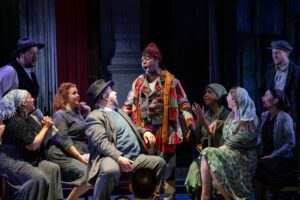
Conductor Francesco Cilluffo secures a moving musical performance from the City of London Sinfonia. His interpretation of the music in conjunction with the director, supports the emotional highs and lows of this explosive operatic work.
Opera Holland Park’s double bill offers a stimulating evening of contrasts, from the light-hearted whimsy of Il Segreto di Susanna to the intense drama of Pagliacci. The excellent weather on the night of my visit only added to this memorable production.
Il Segreto di Susanna:
Music: Ermanno Wolf-Ferrari
Libretto: Enrico Golisciani
Conductor: John Andrews
Director: John Wilkie
Pagliacci
Music and libretto by Ruggero Leoncavallo
Conductor: Francesco Cilluffo
Director: Martin Lloyd-Evans
Until: 03 August 2024
Running time 2 hours 45 minutes including a 30 minute interval
Photo credit: Ali Wright

